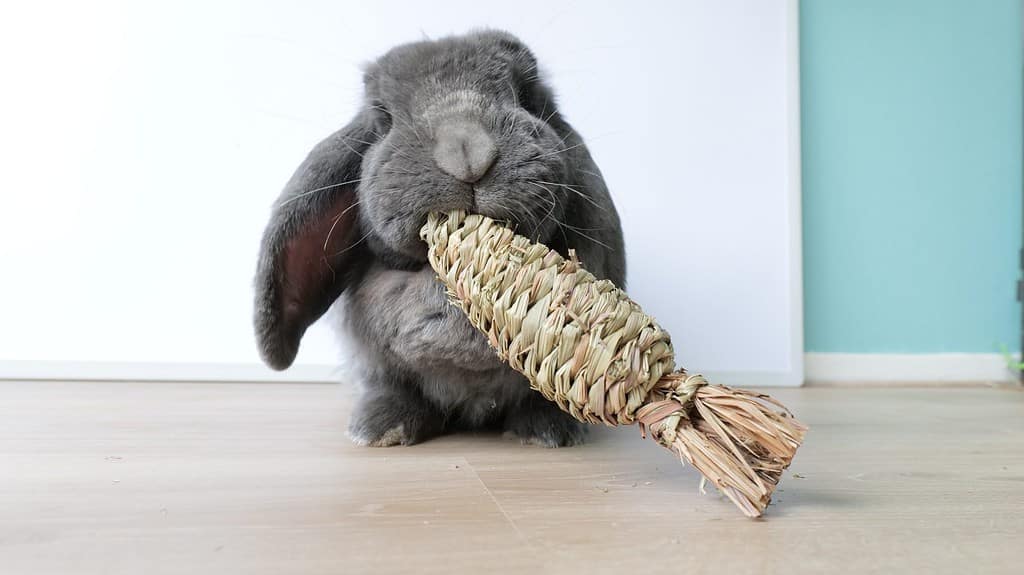Rabbits and ferrets are both small exotic pets but differ in care needs. Rabbits are herbivores that require a large, flat space, such as a bedroom, to free roam. Ferrets are obligate carnivores that live in multi-level cages. Their temperaments, handling, and cleanup also vary.
In this article, we’ll discuss the differences between rabbits vs. ferrets to help you decide which pet is best for you.
Rabbits vs. Ferrets: Diet

Ferrets are obligate carnivores, like cats.
©iStock.com/Irina Vasilevskaia
Ferrets are obligate carnivores, meaning that they must have meat in their diets. Rabbits, on the other hand, are herbivores who eat only plant matter.
Ferrets tend to be easier to feed as you can simply buy a ferret kibble. Rabbit diets are more complex but not too challenging!
The majority of rabbit diets consist of grass hay, which they must have access to 24/7. Next, you’ll want to feed a daily mix of herbs and vegetables, consisting of mostly dark, leafy greens. Most people also feed a small amount of pellets to supplement any missing nutrients in the diet.
Rabbits vs. Ferrets: Temperament
As obligate carnivores, ferrets are predator animals. This makes them much different from prey animals such as rabbits.
While they’re both social animals, ferrets and rabbits socialize with one another–and with humans–in different ways.
Ferrets tend to be more playful in the way you’d expect from a dog or cat, while rabbits are more mellow. They do love to run, binky, and play with toys, though. They especially love things they can chew and throw!
Rabbits vs. Ferrets: Handling

You must support a rabbit’s entire body while holding them.
© leaf/ via Getty Images
Ferrets have much more flexible spines than rabbits, who can suffer from spinal injuries easily. It’s crucial to support your rabbit’s spine when picking them up. Support their front and hind ends, and always hold them with all four feet facing the ground–being on their back triggers an intense stress response that can be detrimental to their health.
One thing rabbits and ferrets have in common is that they can be wriggly and easy to drop! It’s important to hold your pet close to the ground until you’re confident in your abilities to hold onto them.
Rabbits vs. Ferrets: Cage Requirements
Rabbits aren’t cage animals and should never be kept in a small, pet store cage or hutch. The smallest suitable enclosure, including for overnight use, is a large dog exercise pen.
Ideally, your rabbit will free-roam at least one room in your home, similar to a dog or cat. Some people free-roam their ferrets as well, but ferret-proofing tends to be much more difficult since they love to climb and steal items and can fit into small crevices.
The minimum enclosure size for a ferret is a multi-level cage that’s 3 feet wide, 3 feet deep, and 2 feet high.
Like rabbits, ferrets have a lot of energy and shouldn’t be kept in their cage for longer than necessary. They require at least four to six hours outside of the cage daily without exception and benefit from more time than this!
Rabbits vs. Ferrets: Odors and Clean Up

Rabbits and ferrets can both be incredibly messy!
©Mariska van Dasselaar/Shutterstock.com
Both ferrets and rabbits can be litter-trained, which makes their clean-up similar. However, don’t underestimate the mess these animals can make! Daily cleaning is required.
Rabbits in a clean enclosure should have very little odor, but even clean ferrets are smelly.
There’s no way around the ferret stench. Even the controversial practice of descenting does nothing to reduce their odor.
When it comes to cleaning the animals themselves, ferrets can have occasional baths but typically don’t need them. They groom themselves similarly to cats, and baths won’t reduce their smell. Bathing too often can actually make them smellier!
Rabbits can never be bathed as getting wet is dangerous for their health.
Can Rabbits and Ferrets Live Together?
Rabbits and ferrets should never live together, as mixing predator and prey animals is incredibly dangerous. It’s very likely to result in injuries to your rabbit.
Even if your ferret was exceptionally rabbit-friendly, being around predators–especially those with strong scents like ferrets–is very stressful for rabbits. For this reason, it’s not recommended to keep these pets in the same household unless you can keep enough space between them to ensure that they can never interact and that the rabbits can’t smell the ferrets.
Other issues with housing these animals together are their differences in diet, play styles, body language, and enclosure requirements.
Please house your rabbit with at least one other rabbit and your ferret with at least one other ferret to safely meet their social needs.
Thank you for reading! If you have feedback on this post, please contact the AZ Animals editorial team.
The photo featured at the top of this post is ©
Thank you for reading! Have some feedback for us? Contact the AZ Animals editorial team.






